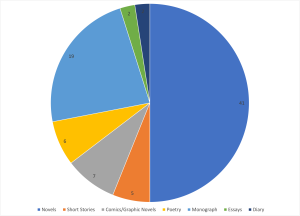A little more music this time around, but I’ll start with a couple of good reads:
Article: “Farther Away” by Jonathan Franzen
Here, Franzen manages to bring together birdwatching, the history of the novel, and the life and death of David Foster Wallace, beautifully and with evident intelligence. I can’t help but feel ambivalent about Franzen; there’s no denying that the guy can put together some incredible sentences, but he also seems to have taken it upon himself to be contemporary literature’s official curmudgeon and, occasionally, luddite (see his recent comments about twitter, for instance: ). However one feels about him, this is worth a read, if only for the way he complicates the image of David Foster Wallace, who began to vanish into a hagiographic fog almost immediately after his death.
Interview: Adam Gopnik on his favorite essay collections
This is an issue of a regular feature on The Browser called Five Books, in which various eminences– mostly but not exclusively writers– choose their five favorite book in some category. This time around, Adam Gopnik, who is a staff writer for the New Yorker and a well-regarded essayist himself, picks his five favorite collections of essays. This is kind of slippery category, which the interview discusses: what counts as an “essay,” how are essays different from criticism, etc. Most of all, each of Gopnik’s choices sounds interesting and none are obvious (at least to me).
Song: “Swervin'” by Clams Casino
One of the things that seems characteristic of contemporary music to me is the seamless combination of disparate sonic elements. In the 1990s, there were lots of artists– Cibo Matto comes to mind, as just one example– who pulled together lots of different genres or styles; usually, though, what was striking about these artists was the way that different sounds seem to sit next to each other rather than to blend, to run in parallel rather than together. There was always a tension between different kinds of sound or influences, which was part of what made the music interesting. Now– and I am not sure what the reason is; maybe something to do with new production technologies– many artists seem to have found ways to relax that tension, and bring different sounds together much more completely. This can be a bad thing, because, again, these were often productive contrasts. When done well, though, you get individual artists who seem almost to constitute entire genres of their own. Clams Casino anchors a wash of mellow, even pretty sounds with these huge, crunchy beats; the result completely distinctive, completely his own, but still feels comfortingly familiar. This track is very much of a piece with his instrumental album, released last year.
Song: “Secret” (feat. Martina Topley-Bird) by Clark
Give it a minute. Or, more precisely, about 34 seconds. What I like about this is the sense one gets of the song not so much developing as being assembled as it moves along. In this sense, it is reminiscent of Amon Tobin’s ISAM, my favorite record of 2011 (though apart from the intensity of the low end that appears just after the two-minute mark, this otherwise sounds nothing like that record). I also like the way that Clark uses Martina Topley-Bird’s vocals as just another sonic element, not fundamentally unlike any of the other sounds, instead of taking a straight vocal track and building everything else around that. I admit that this might not have occurred to me if it weren’t for the presence of Topley-Bird, but the beginning of the track does sound a bit like something Tricky might have done at one point (thinking here of the beginning of “Ponderosa,” or maybe “My Evil is Strong”).
Clark is a produce from the UK, signed to Warp. I don’t know a heck of a lot else about him, except that this is from his forthcoming album Iradelphic, which will be out on April 3 in the US. You can here a couple of other tracks here and here. These sound nothing like “Secret,” until suddenly they kind of do.
Album: Ghosts by Monolake
This is an early candidate for one of my favorite albums of the year. Something of a departure form the spare calm of 2009’s Silence, Ghosts sounds, at times, like a more danceable version of some of Nine Inch Nails’s instrumental stuff; like Trent Reznor, Monolake’s Robert Henke is a master of the use of timbre and texture to create atmosphere, and the atmosphere here is, appropriately enough, haunted. If you don’t have Spotify– well, first of all, go get Spotify; it is both free and awesome– you can listen to some previews of the album here. The CD will be available March 13, but you can buy the MP3 version now.


